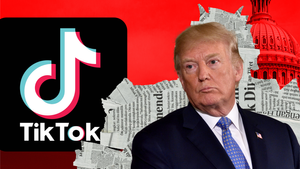The US Supreme Court has ruled that the TikTok-targeting sell-or-be-banned law passed by US Congress last year - banning TikTok within the USA unless China-based owner ByteDance sells the app - does not violate the First Amendment free speech rights of either TikTok or the American creators who publish content on the platform. Therefore the TikTok ban due to go into effect on Sunday will go ahead - sort of.
It’s been confirmed that current President Joe Biden won’t look to enforce the ban on Sunday, and there has been speculation incoming President Donald Trump will seek to intervene through executive order as soon as he is in the White House. Asked about that shortly after the Supreme Court ruling was published, Trump told CNN, “it ultimately goes up to me, so you’re going to see what I’m going to do”.
With TikTok CEO Shou Chew due to attend Trump’s inauguration in Washington DC on Monday, alongside all the other tech sector chiefs who have recently become platinum members of the Trump Suck Up Club, it’s assumed what we’ll see is some kind of executive order that at least pauses the ban. Though with Trump’s unhelpfully vague statement, TikTok’s 170 million users - and the millions of creators, including musicians, who use the platform - go into the weekend uncertain what’s going to happen next.
In their ruling, issued earlier today, the Supreme Court judges write, “There is no doubt that, for more than 170 million Americans, TikTok offers a distinctive and expansive outlet for expression, means of engagement, and source of community”. However, “Congress has determined that divestiture is necessary to address its well-supported national security concerns regarding TikTok’s data collection practices and relationship with a foreign adversary”.
They then reject the arguments put forward by TikTok, and its creators, that key provisions in the sell-or-be-banned law are unconstitutional on free speech grounds. “We conclude that the challenged provisions do not violate petitioners’ First Amendment rights”, the judges write.
With ByteDance insisting that it will not sell TikTok, the company desperately hoped that its First Amendment arguments could stop the ban in the courts, not least because similar arguments successfully stalled Trump’s previous attempt to ban the app during his first presidency, albeit in the lower courts. However, after TikTok’s lawyers presented their arguments in the Supreme Court last week, it was felt that the judges there were not convinced that the sell-or-be-banned law raised free speech issues.
In their lengthy ruling today, the Supreme Court judges stress that Congress has put restrictions on the ownership of TikTok, not any content published on the platform. Provisions in the sell-or-be-banned law “impose TikTok-specific prohibitions due to a foreign adversary’s control over the platform and make divestiture a prerequisite for the platform’s continued operation in the US”, they write, “they do not target particular speech based upon its content or regulate speech based on its function or purpose”.
“Nor do they impose a ‘restriction, penalty or burden’ by reason of content on TikTok”, they go on, “a conclusion confirmed by the fact that petitioners ‘cannot avoid or mitigate’ the effects of the act by altering their speech”. As a result, “the act does not facially regulate ‘particular speech because of the topic discussed or the idea or message expressed’”.
Trump, of course, has famously changed his position on TikTok since he tried to ban it during his first presidency and has now vowed to save the app, while also addressing concerns across the political spectrum that the Chinese government has access to TikTok user data via ByteDance. It remains unclear how he’s going to do that and how quickly he plans to act.
In terms of pausing the ban to buy him and TikTok more time, the sell-or-be-banned law does allow the President to extend the deadline for a sale of TikTok by 90 days. That said, that provision is only meant to be applied if negotiations to sell the app are underway, and it’s not clear if postponement is possible once the ban is already in place. So, what will happen on Monday remains uncertain. Except that - and on this Trump is actually correct - we’ll get to see what he’s going to do. Even if that’s nothing.

